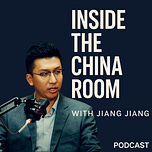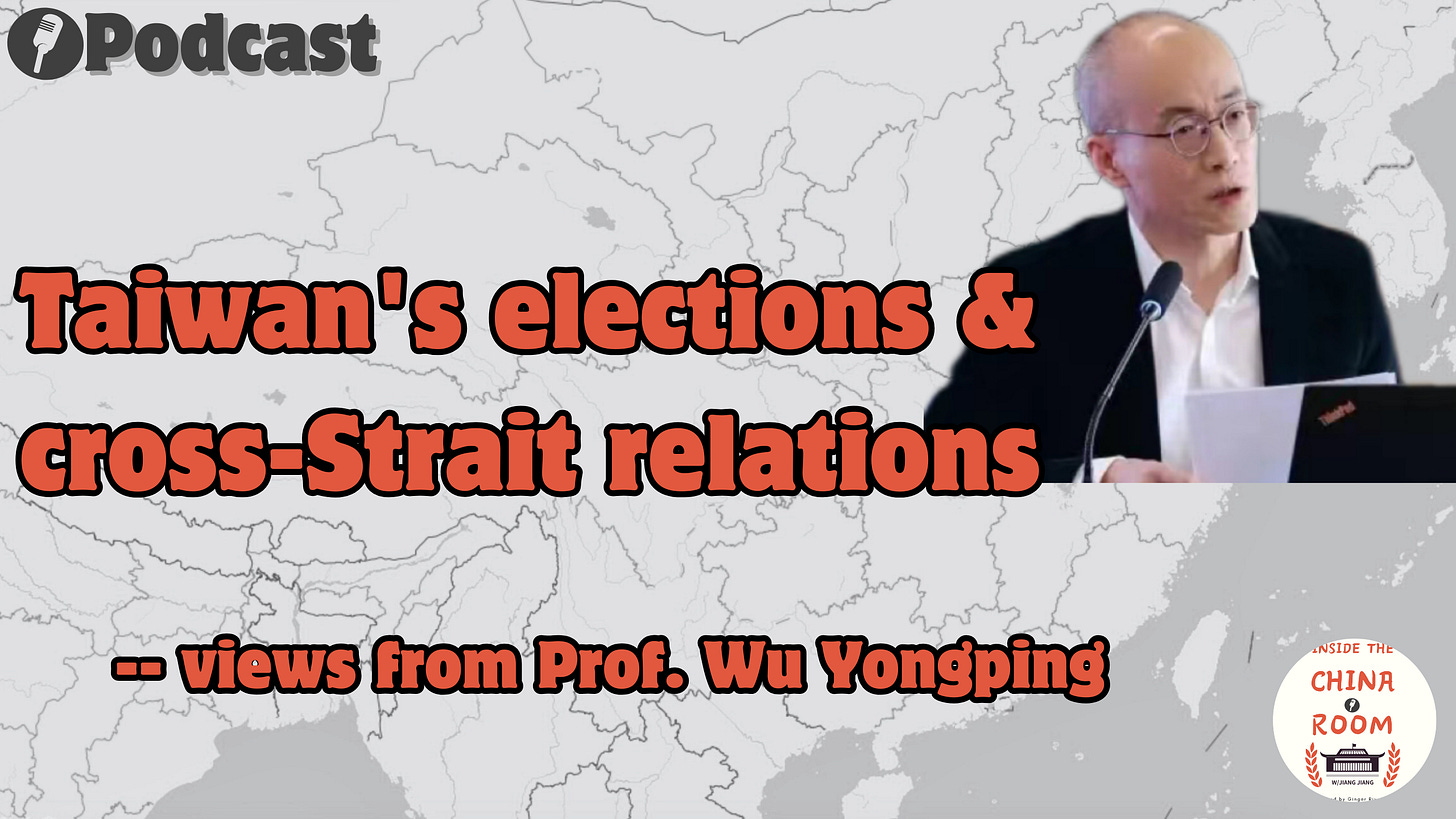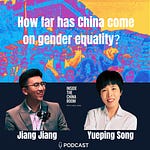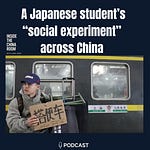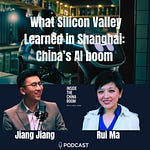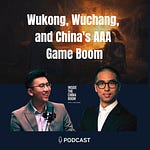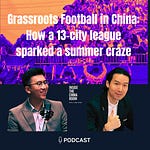This week on Inside the China Room, Jiang Jiang (JJ) welcomes Prof. Wu Yongping 巫永平, the dean of the Institute of Taiwan at Tsinghua University and a renowned expert on Taiwan affairs and cross-Strait relations.
In this episode, Prof. Wu shares his views on the outcomes of Taiwan's elections in January and his understanding of mainstream public opinion, voter divisions on cross-Strait issues, and concerns regarding trust in political figures in Taiwan. He analyzes the performance of the Kuomintang (KMT) in recent elections and the challenges it faces in the coming four years. Additionally, he talks about the influence of the Taiwan People's Party (TPP) and the implications of U.S. government policies on Taiwan. He also elaborates the relationship between the rejuvenation of the Chinese nation and the peaceful reunification with Taiwan.
This episode was recorded on Feb. 2.
Prof. Wu Yongping, the dean of the Institute of Taiwan at Tsinghua University
Highlights:
04:25 - Mainstream public opinion in Taiwan and voters high division on cross-Strait issues
10:03 - Prof. Wu's outlook on cross-Strait relations
14:23 - KMT's dual challenge: modernizing its image while maintaining cross-Strait relations
18:12 - Taiwan People's Party’s influence and future
23:12 - U.S. government's policy on the Taiwan issue
29:18 - China's commitment to integrated development and peaceful reunification
33:50 - Misconceptions about the rejuvenation of the Chinese nation and military preparation
38:00 - Cautioning against self-fulfilling prophecies: analyzing the perils of Sino-U.S. tensions
45:50 - Differences and similarities in challenges faced by Taiwan and the Chinese mainland
You can also listen to Ginger River Radio on Apple Podcasts and Spotify.
A complete transcript of this podcast is available here:
JJ: Welcome to Inside the China Room, a show within the Ginger River Radio podcast series and your go-to podcast for anything about Chinese current events. I'm your host, Jiang Jiang, the founder of Ginger River Review (GRR), a newsletter that focuses on reporting the priorities of both the leadership and the general public in China and views you do not normally see from mainstream English language media.
JJ: On Jan. 13, the Democratic Progressive Party's (DPP) Lai Ching-te, alongside running mate Hsiao Bi-khim, clinched a victory in the leadership race in Taiwan, securing around 40% of the votes. In the legislative elections for the island's 113-seat parliament, the results were closely contested: the Chinese Kuomintang (KMT) party won 52 seats, closely followed by the DPP with 51. The Taiwan People's Party made a notable entry with eight seats, while the remaining two were claimed by independent candidates.
JJ: Fast forward to February 1st, and we witnessed another political milestone. Kaohsiung's charismatic former mayor and KMT nominee , Han Kuo-yu, was elected as Taiwan's legislative speaker. What do these outcomes signify? How will they shape cross-strait relations and influence Sino-U.S. Ties? To help us unpack these questions, I'm joined by Professor Wu Yongping, the dean of the Institute of Taiwan at Tsinghua University and a renowned expert on Taiwan affairs and cross-strait relations. Prof. Wu, thank you for joining us.
Prof. Wu: Hello, JJ. It's my pleasure to be here. Thank you.
JJ: Thank you. You told me that now you're actually in Fujian. May I know why you're in Fujian now?
Prof. Wu: Yeah, I'm in Fujian at this moment.
JJ: Okay. It's your hometown, as you just mentioned.
Prof. Wu: Yeah, it's my hometown.
JJ: Okay. Well, I want to wish you a Happy New Year beforehand.
Prof. Wu: Thank you, you too.
JJ: Thank you. Professor Wu. On January the 13th, shortly after results of Taiwan leadership and legislative elections were unveiled, a spokesperson from the Chinese in mainland for the State Council Time Affairs Office commented on the election result saying that results reveal that the Democratic Progressive Party cannot represent the mainstream public opinion on the island. How do you interpret this statement? What do you believe represents the mainstream public opinion in Taiwan at present? And how do you view the impact of the independence reunification issue in the Taiwan leadership and legislator elections this year.
Prof. Wu: Well, as we know, in the recent election, the ruling party, DPP, the Democratic Progressive Party in Taiwan, only won 40% of the votes. And in the legislative election, it only gained a 51 seats less than the opposition party KMT's seats with 52 seats. So in terms of the two elections results, we can say that the Democratic Progress Party cannot represent the mainstream opinion in the island as what happened yesterday in the legislative speaker election. The opposition party, KMT, warned speaker and the deputy speaker. So the DPP is the second largest party in the legislative branch.
Prof. Wu: So with the two results, only 40% of the votes in Taiwan chose to support the DPP. The rest, the 60% of voters are did not support it. So it did not represent the mainstream public opinion in Taiwan. So it's a minority government. So why the majority of people, the voters in Taiwan do not support DPP? Because DPP doesn't represent people's demand on the island. What people want in the island. What people want in this election, they focus on the internal issues. The issues like a low wage of young people, housing issue, clean energy, corruption, economic growth, elder people's caring, social justice, these all the issues that majority people are concerned about. So in the past eight years, when DPP as a ruling party, it was not able to solve this problem for the people as the traditional, a subject which dominated previous elections in Taiwan, that's independence verse reunification. The voters highly divided on this issue during this election. And this subject does not dominate the election. People still think cross-strait relations is important, but there's no imminent danger. So the cross-strait issue, the independence versus reunification issue, it's still important, but it did not dominate the election.
Prof. Wu: During this election, the overwhelming majority of voters hope to maintain the status across the Taiwan strait. What they want is peace and stability. They don't want war. The DPP candidate, Lai Ching-te, is very provocative in the election to the mainland China. So the majority of the voters did not trust him. So that's why they did not vote Lai Ching-te during the election.
JJ: Yeah, you mentioned that Lai Ching-te was kind of very aggressive in terms of the issues across-strait. There's no enough public support him. So can I say that the mainstream public opinion in Taiwan is that people want peace. And as you just mentioned, people care about internal affairs. And because no party won over 50% votes. So actually now in Taiwan, there is no party that can satisfy people's needs in terms of what you just mentioned.
Prof. Wu: Oh, yes, true. The votes are very highly divided during the election. So no single party one more than 50% of votes. That means the people are highly divided in terms of supporting which party during the direction.
JJ: Okay. And after Lai's victory in election, he said in a press conference that his role has an important responsibility to maintain peace and stability in the Taiwan Strait. And he would commit working to maintain the status quo in Taiwan Strait. It sounds like he also cares a lot about the peace and stability in Taiwan Strait. And this statement does not sound that proactive. So in your opinion, how will Lai's government's cross-strait policy differ from that of Tsai Ing-wen's administration? How do you foresee the future trend in relations between the Chinese mainland and Taiwan in the coming period? How do you comment his statement in the press conference?
Prof. Wu: Well, when Lai said he wanted to maintain peace and stability across the Taiwan Strait, well, it is not enough. And the vital issue is how. Because for Lai, convincing people on how to maintain peace and stability is more important than anyone else, even compared to his predecessor, the incumbent Tsai Ing-wen, because Lai labeled himself as a pragmatic worker of Taiwan independence. So people do not trust him, worry he will take replicated action to pursue his independence goal. The majority of voters in Taiwan do not trust him. The United States does not trust him. Of course, the Chinese mainland does not trust him. So what Lai needs to do to win trust from all parts is to clarify and his stands on the relationship across the Taiwan Strait. If he recognizes one China, that means both sides of the Taiwan Strait belong to one country. Or he will consist of claiming that the two sides of Taiwan belong to two different countries. So this is the pre-condition for peace and stability in the Taiwan Strait.
Prof. Wu: We will watch what he will say during his inauguration on the May 20th. And we will continue to watch what he will do after the May 20th inauguration. If to watch him whether or not he will return to one China stance or he will continue to insist that both sides of the Taiwan Strait belong to two different countries. I'm personally not optimistic about his shift to a new, a more neutral stance on the cross-Strait relations for two reasons. One, he has a goal. The second one, he's very stubborn. Once he has a ideology, it's very difficult for him to change. So I'm not optimistic about the future across the Taiwan Strait. And people on the mainland, very pessimistic about the future of the Taiwan strait in the coming four years.
JJ: Yeah, you mention, just to clarify for our readers, you mention, you just say that we are going to wait and see when you use "we" you were saying the Chinese government or the academic area?
Prof. Wu: Both for the academics and the Chinese government, I think all, not only the Chinese mainland, but the U.S. is also watching him for his provocative stance on cross-Strait relations is not in the U.S. interest either.
JJ: I see. And let's talk about the Kuomintang. You know, the Hou Yu-ih, the KMT's presidential candidate, won 33% of the votes this year. And how do you comment, how do you assess the performance of how and his running mate, Jaw Shaw-kong, in the recent election? And what are the chances of KMT to return to power in four years? How do you see the role of the defeated KMT in the relationship between Taiwan and mainland in the next four years. You just said that you were pessimistic and the people in the mainland are pessimistic about the future of the cross-Strait relations. So does that implicate actually the KMT, which is normally regarded as a pro mainland party in Taiwan will not have a big influence on the political directions in Taiwan.
Prof. Wu: While regarding the election, the committee performed much better than expectation. They won 33% of votes, which reflects its real supporting base because this the first time since two thousand the KMT was united in the general election. So that's why they perform the better than expectation. Even though Hou is not a competitive candidate, they still won 33% of votes. So it's better than expectation.
JJ: Sorry to interrupt you. What was the biggest issue that makes Hou Yu-ih not the most ideal candidate for the election, in your opinion?
Prof. Wu: For many reasons. His personal image is not good and it's not reach people's expectation and he recognize after the election that the Taipei City mayor Chiang Wan-an and he's more like a presidential candidate than Hou was because Chiang Wan-an spoke much better Mandarin than Hou and he's a handsome man. So from what he comments on Chiang Wan-an and you can see his own weakness. So that's also what people think about him.
JJ: He does not trust himself. You're saying that he is not that confident enough?
Prof. Wu: No, he lack confidence for himself. So given all the reasons, the 33% of votes is much better than expectation. Also, we can see from what happened yesterday, the KMT won the legislative speaker. So the KMT is the largest party in the legislative branch. Given the two reasons, KMT will be key player in the coming four years. But for the next election that will happen four years later, for the canteen to return to power, it needs to do somethings because it has some weaknesses. It needs to reform itself to win young people's heart and minds. It needs to change its party image. The party image of a committee is old-fashioned, is a party of elite. It's very bureaucratic. So young people are not attracted to the KMT. So for the KMT, it wants to return to power in four years later, it needs to do more to attract young people. And in the coming four years, the KMT will be a vital force maintaining the relations between the two sides of Taiwan Strait because for a number of reasons. First, the KMT recognizes 92 Consensus is a consensus reached by the KMT government under the mainland in 1992. The core meaning of 92 Consensus is that there's only one China in the world. The both sides of the Taiwan strait belong to one China. The meaning of one China can be expressed differently. So that's the consensus the KMT recognized consensus is a necessary political basis for the two sides of the Taiwan strait to keep a normal relations during the KMT government between 2008 and 2016. The cross-Strait relations was very good because the KMT recognized 92 Consensus, recognize that both sides of Taiwan strait belong to one China. The number two reason is that the KMT will play a checking power to the DPP because of the reason we just mentioned. The committee holds the speaker of the legislative branch, and it is the biggest party in the legislative branch. Also, the KMT controls 14 out of 22 local governments in Taiwan. So it's a powerful political force in Taiwan. So because of the buff reasons, the KMT will play important role in maintaining the cross-Strait relations because the Chinese mainland has a trust in KMT because they recognize the 92 Consensus.
JJ: Yeah, the 1992 Consensus is very important for the Chinese mainland. And we know that young people in Taiwan nowadays, well, it's not that attracted by the KMT. But then we know that they like another party, Ko Wen-je's TPP, the Taiwan People's Party. How do you view the political influence of Ko Wen-je himself and the TPP in the future political landscape of Taiwan? I think they have eight seats in the legislature body. And some said that the Ko Wen-je's cross-Strait policy is somewhat ambiguous. And he said that a friendly attitude should be maintained towards cross-Strait relations. How do you evaluate his discourse on cross-Strait relations?
Prof. Wu: Well, Taiwan People's Party performed very well and it's even better than expectation. It won 26% of the votes during the election and it also won aces in the legislative branch. More importantly, common the wind support of young people. All the 26% of votes are from young people. So that means, the TPP will be increasingly influencing in the future of Taiwan's politics. Young people in Taiwan fond of Ko Wen-je. He has a political charisma, as you just said. His stance on cross-Strait relations is very ambiguous. I think his stance is between the DPP and KMT because he does not recognize 92 Consensus. That means he does not recognize the both sides of the Taiwan Strait belong to one China, but it does not take the stance of Taiwan independce. He also said he will not take provocative activities towards the mainland China. And he also criticized the DPP candidate Lai about being provocative toward the Chinese mainland. He said it's not in Taiwan's interest. So he also said before repeatedly that people on both sides of the strait are one family.
JJ: I think that's a part the Chinese man likes a lot, right? That's a word that's which align with Chinese mainland's policy, right?
Prof. Wu: Yeah, because of this policy, the Twin City Forum is a forum between Taipei City and Shanghai City. I can't remember for how many times when Ko Wen-je was the mayor of Taipei. So I think this is the documents, a stance about the cross-Strait relations. We also emphasize the two sides must be mutual understanding and the both sides does not hit the bottom line of each other. So it's a very important, he said he fully aware of the bottom line of the Chinese mainland. He insist that he will not hit the bottom line of the Chinese mainland. And if the Chinese mainland respect the current political system and the lifestyle of Taiwan people, he'll be willing to talk with the mainland. So that's his stance on cross-Strait relations. Because of this, I personally think the Taiwan People's Party or Ko Wen-je, will also playing as a checking power to the DPP because his relative neutral stance between the KMT and the DPP.
JJ: There is also some efforts that try to create a collision between KMT and TPP before the election but failed. And you said that the KMT needs to in win the young people's hearts and the TPP's future is very promising. Do you think maybe one day TPP's influence will surpass KMT's in the future, maybe someday?
Prof. Wu: It's too early to judge whether or not this will happen because Taiwan People's Party is based on Ko Wen-je's personal charisma. Yeah, so as a party, the party organization is not clear yet. So it's too early to say. It will continue to growth as a major party to replace KMT as the second one, it's too early to say. We need to watch in the coming four years.
JJ: I also see some people commented in Taiwan that actually the quality of the talents who joined TPP is not that good enough because it is comparatively a very young party. So yeah, it's take time for a young party to grow, I guess. And let's move to the Taiwan issues from perspective of the U.S. government. Following the conclusion of the Taiwan election, U.S. President Joe Biden said in an interview that he does not support for "Taiwan independence," while U.S. Secretary of State Blinken expressed expectations of deepening informal U.S.-Taiwan relations. In this context, do you believe there has been a change in the U.S. attitude towards Taiwan question? How should China respond to the U.S. policy of "using Taiwan to contain China"?
Prof. Wu: Well, in the extremely complicated Sino-U.S. relations, Taiwan question is the most important and the most sensitive factor from Carter administration to Obama administration as U.S. follows strategic ambiguity on Taiwan question and on one China policy. However, it has scrapped strategic ambiguity since Trump administration, it upgraded official relations with Taipei, increased unsafety to Taiwan. Some U.S. officials emphasize the strategic value of Taiwan to U.S. security. President Biden explicitly said for four times, let me emphasize, for four times, the U.S. would support Taiwan when there's a war in Taiwan Strait. All these have hollowed out is one China policy. So one question has to be raised. After all these happened, has the U.S. shifted from one China to one China, one Taiwan? So from the Chinese perspective view, all these have hollowed out is one China policy. So it is very provocative and is very danger because it encourages pro independence activities on Taiwan. So given all these, it's good that President Biden expressed recently that the U.S. does not support for Taiwan independence after the election result came out. However, the experience of the past few years reminds us that the U.S. must do what is said since Taiwan question is the core of China's core interests. China will do whatever it can to protect its interest. If the U.S. does not change its tactics of using Taiwan to contain China, as what it did in the recent years. It is difficult to maintain peace and stability in the Taiwan Strait. However, maintaining peace and stability, it's in the interest of all parts, including the U.S. so abide by one China policy is in U.S. own interests. So I hope President Biden expresses that not supporting Taiwan independence is a real policy.
JJ: Sometimes. Well, President Joe Biden's speaks can make people confuse because sometimes he said something and next time, next day, the White House spokesperson came out and saying something that he does not mean that. And yeah, I think it's important for the U.S. government to understand the Taiwan question is very sensitive and it's a core issue of China. And in October last year, the Chinese government issued a circular on the cross-Strait Fujian and Taiwan integration development plan. You are in Fujian. You're from Fujian. Some people actually believe the mainland should more actively promote multilateral opening policies towards Taiwanese. If China do that, actually I believe, Fujian will definitely be the pilot area for such type of multilateral opening policies. So how do you evaluate the policy measures for integrated development across the Taiwan Strait? Also with Lai Ching-te leading the government in the coming four years, will these policies be effectively implemented and achieve certain results?
Prof. Wu: Well, the cross-Strait integrated development is a strategic deployment plan. And for the Chinese mainland, I just went to Fuzhou, the capital of the Fujian province two days ago, to do some research about the situation of integrated development and got a lot of valuable information. As we all know, achieve reunification peacefully is national strategy of the Chinese mainland. So the key to achieve a peaceful reunification is to win people's hearts and minds in Taiwan. And it's particularly important when lacking of trust in the cross-Strait relations in the recent years. The cross-Strait relations will be difficult in the coming four years, as we just discussed, because of the continuing ruling of the DPP, because of Lai's personal independence mindset and stubborn personality. So the integrated development will be more important because of the situation. And to be honest, it will be more difficult because the DPP as will take any measures it can to block the exchange and communication across the Taiwan Strait as what it did in the past eight years, and I personally believe Lai will do more in the coming years after his inauguration. So what the Chinese mainland can do is to do what is under our own control.
Prof. Wu: My personal understanding of the integrated development is to realize "one country one system" on this side of the Taiwan Strait. It means we provide the achievement to Taiwanese to come to the mainland. The citizens are the nationalize treatment of the people on the mainland. So local government in Fujian will take initiative using its own strengthnesses with Taiwan in terms of geographic relations. Just across the strait, most of Taiwan people come from Fujian. So people share the same culture, religion, language, food, many things. So the Fujian province will use all advantages to provide a conveniences for Taiwan people to settle in Fujian for the living, employee, running business and studying in Fujian.
Prof. Wu: I think that will set examples on one country one system on the mainland side. We all know that after reunification, Taiwan will practice one country, two systems that means Taiwan will maintain all the systems they have currently. But on the mainland side of Taiwan Strait, we will take one country one system. We treat the Taiwanese same as the mainland people. So I think the significance of the integrated development plan announced by the central government, it's very important. It will drive a closer relationship between people from the two sides of the Taiwan strait. It will pave the way for peaceful reunification in the coming years.
JJ: You said you were in Fuzhou days ago. Have you met any Taiwanese in Fujian? I'm sure you you have, right? Have you have any communications with them? Do you have any interesting findings when after you communicate with them?
Prof. Wu: Yeah, I met many people from Taiwan who lived in Fuzhou, in Xiamen, in other areas of Fujian. They excited about the circular on the integrated development. Well, as a matter of fact, the integrated development has been and developed for many years in Fujian. People felt more convenient living in Fujian province in terms of living, working and studying, a small measures taken by local governments.
JJ: Yeah, and In 2022, the Chinese government published a white paper titled "The Taiwan Question and China's Reunification in the New Era" which mentioned "Resolving the Taiwan question and realizing China's complete reunification is indispensable for the realization of China's rejuvenation." There have been many interpretations of this, China's rejuvenation overseas. How do you think it should be interpreted? So reunification is a goal or is not that necessary to be a part of that?
Prof. Wu: Well, realizing reunification is a nation mission of China after the return of Hong Kong and Macau in the late 20th century, the return of Taiwan will be the last one of complete reunification of China. No Chinese leader can bear the consequence of losing Taiwan. So we must realize this. China's reunification and the Chinese government, since the peaceful reunification is a policy since 1980 on the Chinese mainland. This principle has never change. Peaceful reunification as a national principle has never been changed. I understand there are some speculations about China's plan of taking Taiwan. If we have changed principle, the policy, if we want to take Taiwan with force, people even speculate that there's some timetables for the Chinese mainland to take Taiwan. What I personally think all these speculations are not true. Realizing modernization and China's rejuvenation is the utmost goal of China. We hope this goal will not be interrupted by anything. So of course, peaceful reunification is one of goals of China. But modernization, China's rejuvenation is a more general mission of the country.
Prof. Wu: We have confidence that we can realize peaceful reunification when the conditions are prepared and mature. So whenever the conditions for reunification are ready, we will realize the goal. But during the process, we will do our best to realize modernization and realize national rejuvenation. So I think that's the relations between the two. In the meanwhile, military preparation is for deterring and smashing Taiwan independence activities. It's not for reunification. So I think outsiders often misunderstand our stance on military preparation. So I want to emphasize that military preparation is for deterring and smashing Taiwan independence activities, not for reunification. We will do many things to realize reunification, including integrated development, including to win young people in Taiwan's hearts and minds, to build common interests, to build common values, to driving people closer out of the two sides of Chinese people, to realize reunification. So it will be a peaceful reunification.
JJ: Yeah, I think also the Chinese president Xi Jinping said that China is patient with the peaceful reunification. And there are also some other similar expressions about China's strategy. But sometimes these were overlooked by some overseas China watchers and policymakers. Actually, some international China observers have express to me that the policymakers in the United States have already considered Taiwan strait war as an ongoing event when formulating relevant foreign policies. How do you believe this logic in policy making will impact same Sino-U.S. relations, Taiwan strait stability and the geopolitical situation in the region. And how do you assess the likelihood of military conflict breaking out in the Taiwan Strait at present? You mentioned that China's military preparation is more about deterrence, but we cannot, you know, make sure that the other side, Lai's administration and the U.S. government, what will they do? So how will you assess the possibility of a conflict in the Taiwan Strait?
Prof. Wu: We must be clear, a war in the Taiwan Strait is in no one's interest. So China's policy is a peaceful reunification. If the US has such a plan, as you just mentioned, China will have to respond accordingly. We have no choice so that will upgrade the tensions between the U.S. and China. No one want to see the upgrading of tensions between the two countries. It's not in anyone's interests. So if that happens, then we will see a self-fulfilling prophecy. If you expect war and you prepare for war, there will be a war. So this is dangerous. I hope it's just speculation. It's not a plan.
JJ: Before I let you go, I want to ask about some of your personal experience. Because I knew that you have travelled to Taiwan twice in 1996 to 1997 and 1997 to 1998 to conduct research for your doctoral paper and became the first doctoral student register at Taiwan University who came from the Chinese mainland. So looking back to your experience in Taiwan in the academic field as a mainland expert in Taiwan studies, how do you assess the current status of cross-Strait academic exchanges compared to the time when you went there and started in Taiwan? And what do you think is the latest consensus among the mainland academic field regarding peaceful settlement of the Taiwan question?
Prof. Wu: There's an extraordinary change and development in the past years from my first touch on Taiwan soil in 1996 until now. When I went to Taiwan first time, Taiwan's GDP accounts for 45% of the mainland's GDP. JJ: That's unbelievable. Prof. Wu: Yeah, and now Taiwan accounts for about 5% of mainland's GDP. So you can see the extraordinary change of the situation in the both sides of the Taiwan Strait. And when I went to Taiwan first time, the exchange, including academic exchange just began for a short time. So there's no much exchange between the two sides of the strait. Well, after then, there's a lot of change in terms of exchange, including academic exchange. It's very complicated. Until 2018, the academic exchange between the two sides of the strait has been extensive. Cross-Strait visits, conferences, collaborations between scholars had been enormous. I personally visit Taiwan three or four times a year before 2019. I've never been to Taiwan since 2019. Well, pandemic is partly blame for this. But the big obstacle is politics. The ruling DPP party took measures to discourage cross-Strait academic exchange since 2018. So it's hard to see Taiwan counterparts on the mainland last year after the pandemic because Taiwan counterparts do not want to come to mainland because they want to show the pressure are pushed by the government. So we describe the situation as a green horror in Taiwan. That means the ruling DPP party took many measures to discourage academic exchange between the scholars from two sides. The situation will continue after Lai takes power. So I believe the academic change would be difficult in the coming four years if the situation will not change.
JJ: Yeah, I see. Prof. Wu, what make you make the decisions to devote yourself into the studies of Taiwan related issues? I know it might not be the only subject that you started in your whole career, but what makes you make the decision to devote yourself to this field? What drives you to study this?
Prof. Wu: Well, when I took the subject of Taiwan subject, I was interest in development. When I plan to pursue PhD study in Leyden University in the Netherlands, Taiwan was a successful economic example since the 1980s. So I hope to compare the development of Taiwan and the mainland and how that the mainland can learn something from Taiwan's experience in terms of economic development. That's why I chose Taiwan as my PhD subject. So I went to Taiwan to do field work. I met many retired Taiwanese officials who made economic policies during the 1950s, 60s and 70s in which the Taiwan economic miracle took place. All the officials came from the Chinese Mainland. They were extremely happy about one young student from the Chinese Mainland taking the Taiwan experience as a PhD subject. So they are very helpful to offer me their personal views and experience about the Taiwan's economic development under the economic policies from their hands. So that period of experience is very helpful for me, for my research and for my PhD thesis writing, which was published by Harvard University in 2005. And after returning from Harvard, where I did my post-doctoral research, I went to Tsinghua University. It's a the school of Public Policy and management. So my interest is economic development, market economy, government and market relations. So naturally I expand my research from Taiwan to the Chinese Mainland. So a Taiwan study or cross-Strait relation study, is part of my research interests. So that's why I'm still in the field as a member of across-Strait research circle on the Chinese mainland.
JJ: Do you believe that nowadays Chinese mainland still can learn something from Taiwan in terms of governance or any other field, because China actually develops very fast, right?
Prof. Wu: Well, it's a good question. In the very beginning, I felt that the Chinese mainland can learn many things from Taiwan. But after a long time of research, and at the one point I realize that, the mainland can still learn something from Taiwan. But given the huge difference in terms of sizes between Chinese mainland, things are much more complicated on the mainland than in Taiwan for Taiwan is one of the provinces of China and China is the entire China. So in many aspects, the problems faced by Taiwan are different from the problems faced by the entire China. So I realize we cannot learn from anyone, including Taiwan in terms of many things because of the size of China. But still, we can learn something from Taiwan because as a society moving earlier to a modern time than the mainland. So the problem faced by Taiwan are problems faced by any other societies when they reach the same period of development. So the Chinese mainland will face the problems, challenges faced by Taiwan at this moment as what happened. And looking back, we have faced many problems and challenges faced by Taiwan earlier than us, and we solved the problems with very same ways. So I think we will continue to learn something from Taiwan because we will face the same problems and challenges faced by Taiwan as an elderly society, such as caring for elderly people, environmental challenges, social justice, and green energy. So we face the same challenges.
JJ: Thank you very much, Prof. Wu. Thank you so much for giving us time and talking to us, especially when you are having a holiday in Fujian.
Prof. Wu: It's my pleasure.
JJ : Thank you. And well, I haven't been to Taiwan. I hope one day I can go to Taiwan and learn the situation there and come back and talking to you again.
Prof. Wu: See you again.
JJ : Thank you, Prof. Wu. See you.
JJ: Thank you for listening to the Inside the China Room podcast. For cooperation, investing, or feedback, you can email me directly at jjiang.sisu@hotmail.com. Alternatively, please consider leaving a rating and review on Apple Podcasts, Spotify or Substack. If you find our podcast helpful, we would be delighted if you recommend it to others. See you next time and take care!

